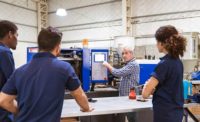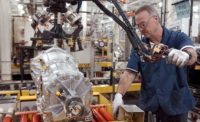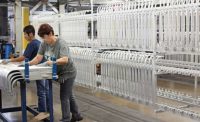While preparing for a recent trip to Ecuador, my wife and I spent hours practicing conversational Spanish. Once we got there, however, it became painfully clear that old dogs couldn’t learn new tricks. “Dónde está…um…the bird?” The best time to learn a language is when you’re young.
The same might be said for manufacturing skills. The best way to develop a skilled workforce is to get young people excited about careers in manufacturing. To that end, I’m pleased to report that a growing number of high schools are doing just that.
On April 13, the Bosch Rexroth Advanced Manufacturing and Technology Center opened at the Olympic Community of Schools, a group of five theme-based high schools in Charlotte, NC. Spanning 2,839 square feet, the $200,000 center was initiated by a founding grant of $80,000 by Bosch Rexroth Corp.
The facility will support a new Advanced Manufacturing Hub at the schools and provide students with hands-on experience using state-of-the-art manufacturing technologies. The center is equipped with the latest metal-cutting and finishing technology, including lathes, milling machines, saws, grinders and metrology equipment.
Olympic isn’t the only U.S. high school with an advanced manufacturing lab. Wheeling (IL) High School in suburban Chicago has been offering such training for six years now. Graduates can apply for college or go directly into the workforce. Students who complete the program can earn certification from the National Institute for Metal Working Skills or the Manufacturing Skill Standards Council, and they can participate in internship programs.
According to Bosch Rexroth’s Erwin Wieckowski, executive vice president for factory automation, the manufacturing center at Olympic is part of a strategy to get young people excited about manufacturing. “Filling key technical positions in our factory here in Charlotte has never been harder,” he says. “Our investment in the [center] will help us to build the technically skilled workforce that we need locally. That’s something that all of us in the manufacturing community can rally around.”
Indeed. Since January 2010, employment at U.S. factories has risen by 900,000 to 12.3 million, recouping more than 30 percent of the jobs industry lost in the downturn. However, more than 500,000 skilled manufacturing jobs remain unfilled. What’s more, that number could increase as Americans age out of the workforce. By 2030, more than 20 percent of Americans are projected to be 65 and older, compared with 13 percent in 2010 and 9.8 percent in 1970, according to U.S. Census Bureau. Clearly, we need young blood.
We applaud high schools like Olympic and Wheeling for recognizing that not every student is college-bound and that manufacturing can be a rewarding career path. We thank Bosch Rexroth and other forward-thinking manufacturers for taking the lead in addressing the skills gap and investing in our future.




